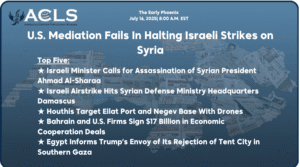By: Rania Kisar
★ Seeking to end Red Sea blockade, Egypt engages Houthis.
With Suez Canal traffic plummeting, Egypt opened a high-profile dialogue with Houthi leaders aiming to de-escalate tensions in the Red Sea and restore normal shipping on the strategically vital maritime route. Though grounded in traditional conflict resolution tactics, this Egyptian approach is unlikely to work. In the context of Arab politics and tradition, the Houthis will perceive Egypt’s outreach as a sign of capitulation and of fear and weakness on Cairo’s part–and as a sign that the Houthis’ missile blackmail is working. Rather than defuse tensions, this perception is likely to embolden the Houthis to intensify their attacks until their broader demands, ostensibly linked to the situation in Gaza, are met.
However, Egypt’s outreach is fatally undermined by another dynamic: that the Houthis are acting as executors of the Iranian Supreme Leader’s broader regional strategy, with much larger goals than whatever local concessions Egypt might be able to deliver to the Houthis. To be effective, Egypt’s response will have to be more assertive. Instead of implicitly validating the Houthis’ pretext that their Red Sea attacks are meant to serve the Gaza cause, Egypt will have to warn that continued actions that destabilize the region’s economy, including Egypt’s own, will lead to the imposition of costs not just against the Houthis, but against the Iranian regime that is backing the Houthis’ aggressive tactics. Cairo’s real conversation, therefore, will ultimately have to be directed to Khamenei himself, if Egypt is to effectively address the root cause of the escalation.



